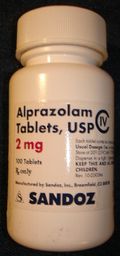|
Find information on thousands of medical conditions and prescription drugs.
|
|
|
Alprazolam
Alprazolam is a short-acting benzodiazepine used to treat anxiety disorders. It is generally sold in generic form (i.e., alprazolam) in the United States (to cut down on costs for insurance companies) and also under many other brand names, depending on the country: more...
 Home Home
 Diseases Diseases
 Medicines Medicines
 A A
 B B
 C C
 D D
 E E
 F F
 G G
 H H
 I I
 J J
 K K
 L L
 M M
 N N
 O O
 P P
 Q Q
 R R
 S S
 T T
 U U
 V V
 W W
 X X
 Alprazolam Alprazolam
 Xeloda Xeloda
 Xeloda Xeloda
 Xeneisol Xeneisol
 Xenical Xenical
 Xylazine Xylazine
 Xylocaine Xylocaine
 Xylometazoline Xylometazoline
 Xyrem Xyrem
 Y Y
 Z Z
- Xanax® - United States, Australia, United Kingdom
- Xanax XR® - (an extended release formulation) United States
- Apotex® - Canada
- Xanor® - Finland, Philippines, South Africa, Sweden
- Kalma® - Australia, New Zealand
- Ralozam® - Australia, New Zealand
- Zamhexal® - Australia
- Alplax® - Argentina
- Alviz® - Indonesia
- Alzolam® - India, Malaysia
- Alprax® - India
- Tranax® - India
- Restyl® - Bahrain, Cyprus, Egypt, Iran, Iraq, Jordan, Kuwait, Lebanon, Libya, Oman, Qatar, Republic of Yemen, Saudi Arabia, Syria, United Arab Emirates
- Tranquinal® - Ecuador, Peru
- Trankimazin® - Spain
- Tafil® - Costa Rica, Denmark, El Salvador, Germany, Guatemala, Honduras, Mexico, Nicaragua, Panama, Venezuela
- Tafil AP® - (an extended release formulation) Mexico
- Constan® - Japan
- Solanax® - Japan
- Zolarem® - Bahrain, Benin, Burkina-Faso, Cyprus, Egypt, Ethiopia, Gambia, Ghana, Guinea, Iran, Iraq, Israel, Ivory Coast, Jordan, Kenya, Kuwait, Lebanon, Liberia, Libya, Malawi, Mali, Mauritania, Mauritius, Morocco, Niger, Nigeria, Oman, Qatar, Republic of Yemen, Saudi Arabia, Senegal, Seychelles, Sierra-Leone, South Africa, Sudan, Syria, Tanzania, Tunia, Uganda, United Arab Emirates, Zambia, Zimbabwe
- Zoldac® - Benin, Burkina-Faso, Ethiopia, Gambia, Ghana, Guinea, India, Ivory Coast, Kenya, Liberia, Malawi, Mali, Mauritania, Mauritius, Morocco, Niger, Nigeria, Senegal, Seychelles, Sierra-Leone, South Africa, Sudan, Tanzania, Tunia, Uganda, Zambia, Zimbabwe
Alprazolam has a calming effect, with the most common side effects being drowsiness, clumsiness, and to a lesser extent, fatigue, and headache. It can also have more adverse effects, such as blurred vision, slurred speech or dysarthria, and changes in personality. It may be habit forming and users often develop a tolerance to its initial effects, although its anxiolytic efficacy remains intact. Physical and/or psychological dependence may develop after several weeks of alprazolam treatment. There is now a general consensus among many psychiatrists that alprazolam (a so-called 'high-potency' benzodiazepine) poses a particularly high risk for abuse and dependence. Withdrawal after long-term use should be done slowly over a period of weeks to avoid serious withdrawal symptoms such as agitation, rebound anxiety, muscle cramps and possible seizures. Some patients may benefit from a more gradual dosage reduction and/or discontinuation and substitution with diazepam.
Read more at Wikipedia.org
• [List your site here Free!]
|
|
|
|
Use of alprazolam in premenstrual syndrome - Tips from Other Journals
From American Family Physician,
12/1/93
Alprazolam, a benzodiazepine, has been studied as a possible treatment for the anxiety- and depression-like components of premenstrual syndrome, but the results of these studies have been inconclusive. Schmidt and colleagues performed a randomized, double-blind, placebo-controlled crossover trial of alprazolam in women with prospectively confirmed premenstrual syndrome.
Women were recruited by newspaper advertisements or physician referral. Twenty women completed the study. A diagnosis of premenstrual syndrome was confirmed through the use of daily self-rating symptom checklists. The women were randomized to receive alprazolam or placebo from day 16 of the menstrual cycle until the onset of menses. Over four menstrual cycles, the alprazolam dose was increased from 0.25 mg to 0.75 mg three times a day. The women completed checklists daily and a battery of psychiatric screening questionnaires twice monthly. Results of these measures in placebo and alprazolam months were then compared.
No differences were found in self-rating scores between alprazolam months and placebo months. Results of psychiatric screening also did not differ between treatment and placebo months, except for a statistically, but not clinically significant, improvement in depression scores during alprazolam treatment.
The authors conclude that no uniform improvement in symptoms of premenstrual syndrome occurs in patients receiving alprazolam, although patients with strong depressive symptoms may have some benefit. (Archives of General Psychiatry, June 1993, vol. 50, p. 467)
COPYRIGHT 1993 American Academy of Family Physicians
COPYRIGHT 2004 Gale Group
Return to Alprazolam
|
|




